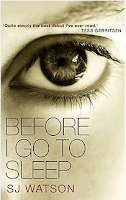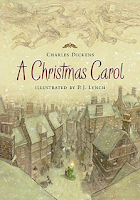Now that Father Christmas has visited, the last of the turkey has been eaten in a late-night sandwich and the tin of Quality Street (or Cadbury Roses) has depleted severely, our attention is turning towards the impending New Year. It's a time in which we find ourselves looking back over the past year, reflecting on all that has - or hasn't - happened, and marvelling at how quickly time passes. It's also a time in which we will be forced to make unrealistic promises to ourselves and others, usually relating to health and alcohol consumption and often accompanied by the caress of a swollen stomach, or the clutching of an aching head. In the time-honoured tradition, I have determined that I will make a few book-related resolutions, as writing this blog has made me realise quite a few things about books that I hadn't considered before. So, for all and sundry to see - thus hopefully making me more likely to keep them - here are my Bookish Resolutions.
1. If I start a book, I have to finish it (with one condition...)
Too often I pick up a book and, barely 3 pages in, cast it aside in a disinterested manner. This has actually proven to be a bit of a downfall, as I have effectively delayed several great books from making their way into my life - one such example is Rook, by Daniel O'Malley, which I downloaded in my first Kindle-spree and then ignored for months, except for one or two occasions when I did half-heartedly read a few pages before promptly going back to ignoring it again. Another is the incredible Before I Go To Sleep by S. J. Watson, which again, I had sat on my Kindle for months before I gave it the proper attention it deserved - I then read it all in one day, because it was simply too hard to put down. These titles - and others - have made me realise that I need to trust my own judgement a bit; if at some point I picked it, for whatever reason, I need to follow my instincts and give the book a fair chance, and not just give up a few pages in. I'd like to apply a caveat, however; I reckon that, by about 50 pages in, I'd probably know if I was going to enjoy it or not. So I need to read at least the first 50 pages of a book before I decide whether to keep reading or not. That's fair, right?
2. To take recommendations on board
 Several times this year, lovely people have recommended books to me, and I have - for a time - ignored them completely. It hasn't occurred to me that these people might actually know me quite well, and may well know what I might like. So I've snootily - and probably a bit patronisingly - acknowledged their suggestions, and then not done anything about them for ages. Again, this has proved to be to my own detriment, so I'd like to take a moment to thank a few people for their suggestions - sorry if I miss people out but hey, it's been a long year and these are the ones I remember most!
Several times this year, lovely people have recommended books to me, and I have - for a time - ignored them completely. It hasn't occurred to me that these people might actually know me quite well, and may well know what I might like. So I've snootily - and probably a bit patronisingly - acknowledged their suggestions, and then not done anything about them for ages. Again, this has proved to be to my own detriment, so I'd like to take a moment to thank a few people for their suggestions - sorry if I miss people out but hey, it's been a long year and these are the ones I remember most!
3. To read more "Classics"
 A little while ago, I made a rather rash decision to attempt to work my way through a Top 100 Books list. Needless to say, it hasn't worked out well; I find that, for some books anyway, you need to be in a certain mindset to attempt them, and there's no point trying to force yourself. Nevertheless, it's high time I tried some of these titles, and I thought it might be best if I had a go at limiting myself to a select few, so that I can work my way through in easy chunks. Working on this, below are the first novels I plan to tackle.
A little while ago, I made a rather rash decision to attempt to work my way through a Top 100 Books list. Needless to say, it hasn't worked out well; I find that, for some books anyway, you need to be in a certain mindset to attempt them, and there's no point trying to force yourself. Nevertheless, it's high time I tried some of these titles, and I thought it might be best if I had a go at limiting myself to a select few, so that I can work my way through in easy chunks. Working on this, below are the first novels I plan to tackle.
1. If I start a book, I have to finish it (with one condition...)
Too often I pick up a book and, barely 3 pages in, cast it aside in a disinterested manner. This has actually proven to be a bit of a downfall, as I have effectively delayed several great books from making their way into my life - one such example is Rook, by Daniel O'Malley, which I downloaded in my first Kindle-spree and then ignored for months, except for one or two occasions when I did half-heartedly read a few pages before promptly going back to ignoring it again. Another is the incredible Before I Go To Sleep by S. J. Watson, which again, I had sat on my Kindle for months before I gave it the proper attention it deserved - I then read it all in one day, because it was simply too hard to put down. These titles - and others - have made me realise that I need to trust my own judgement a bit; if at some point I picked it, for whatever reason, I need to follow my instincts and give the book a fair chance, and not just give up a few pages in. I'd like to apply a caveat, however; I reckon that, by about 50 pages in, I'd probably know if I was going to enjoy it or not. So I need to read at least the first 50 pages of a book before I decide whether to keep reading or not. That's fair, right?
2. To take recommendations on board
 Several times this year, lovely people have recommended books to me, and I have - for a time - ignored them completely. It hasn't occurred to me that these people might actually know me quite well, and may well know what I might like. So I've snootily - and probably a bit patronisingly - acknowledged their suggestions, and then not done anything about them for ages. Again, this has proved to be to my own detriment, so I'd like to take a moment to thank a few people for their suggestions - sorry if I miss people out but hey, it's been a long year and these are the ones I remember most!
Several times this year, lovely people have recommended books to me, and I have - for a time - ignored them completely. It hasn't occurred to me that these people might actually know me quite well, and may well know what I might like. So I've snootily - and probably a bit patronisingly - acknowledged their suggestions, and then not done anything about them for ages. Again, this has proved to be to my own detriment, so I'd like to take a moment to thank a few people for their suggestions - sorry if I miss people out but hey, it's been a long year and these are the ones I remember most!- Bradley and Hannah for A Song of Ice and Fire by George R. R. Martin. You were right, guys!
- Harriet and Sarah for Before I Go To Sleep by S.J Watson. I downloaded this before either of you recommended it, but then didn't read it - yet you both suggested it to me completely separate of the other. I should've clocked on earlier!
- Dave for The Grapes of Wrath by John Steinbeck and Nineteen-Eighty-Four by George Orwell. I wouldn't have read these if you hadn't bought them.
3. To read more "Classics"
 A little while ago, I made a rather rash decision to attempt to work my way through a Top 100 Books list. Needless to say, it hasn't worked out well; I find that, for some books anyway, you need to be in a certain mindset to attempt them, and there's no point trying to force yourself. Nevertheless, it's high time I tried some of these titles, and I thought it might be best if I had a go at limiting myself to a select few, so that I can work my way through in easy chunks. Working on this, below are the first novels I plan to tackle.
A little while ago, I made a rather rash decision to attempt to work my way through a Top 100 Books list. Needless to say, it hasn't worked out well; I find that, for some books anyway, you need to be in a certain mindset to attempt them, and there's no point trying to force yourself. Nevertheless, it's high time I tried some of these titles, and I thought it might be best if I had a go at limiting myself to a select few, so that I can work my way through in easy chunks. Working on this, below are the first novels I plan to tackle.- The Catcher in the Rye by J.D. Salinger. Just feel I need to read this one as two people have recommended it to me in the past year, and this will help me achieve resolution number 2.
- The Divine Comedy by Dante Alighieri. I've had this sat on my shelf for ages now and it's just starting to bother me.
- Catch 22 by Joseph Heller. I've attempted this so many times but never got beyond 50 pages, so I need to give this another go.
- Paradise Lost by John Milton. Having studied books 9 and 10 of this poem at school, I know I quite liked it, so why I've never got past book 2 in a serious attempt is beyond me. Must try harder!
It's only a small list to start with, but I figure if I can get through these tomes, I can get through any!
Hopefully, writing all this down will make it a bit easier for me to follow my own rules - it's like the time I gave up sugar in my tea for Lent, I never would've succeeded if I hadn't told so many people about it and backed myself into a corner. But I am determined to give more literature more respect in 2013, in the hope that, when I write my 'Best of 2013' list next year, I'll have lots and lots more first-reads to choose from.
Happy New Year, everyone!
















